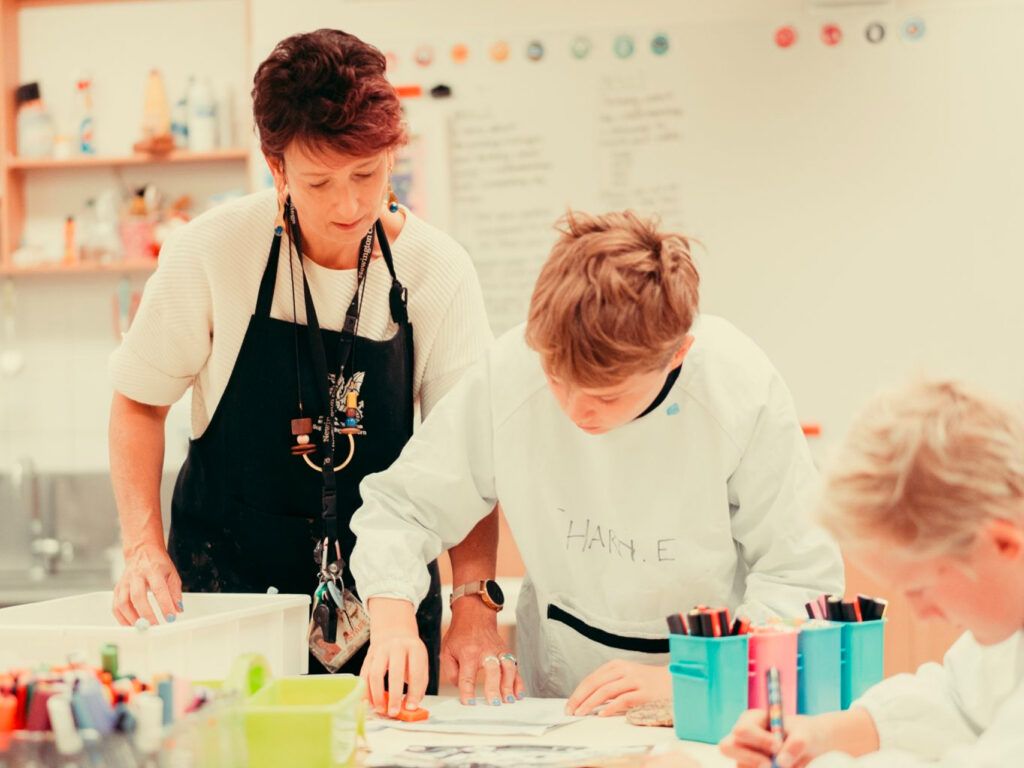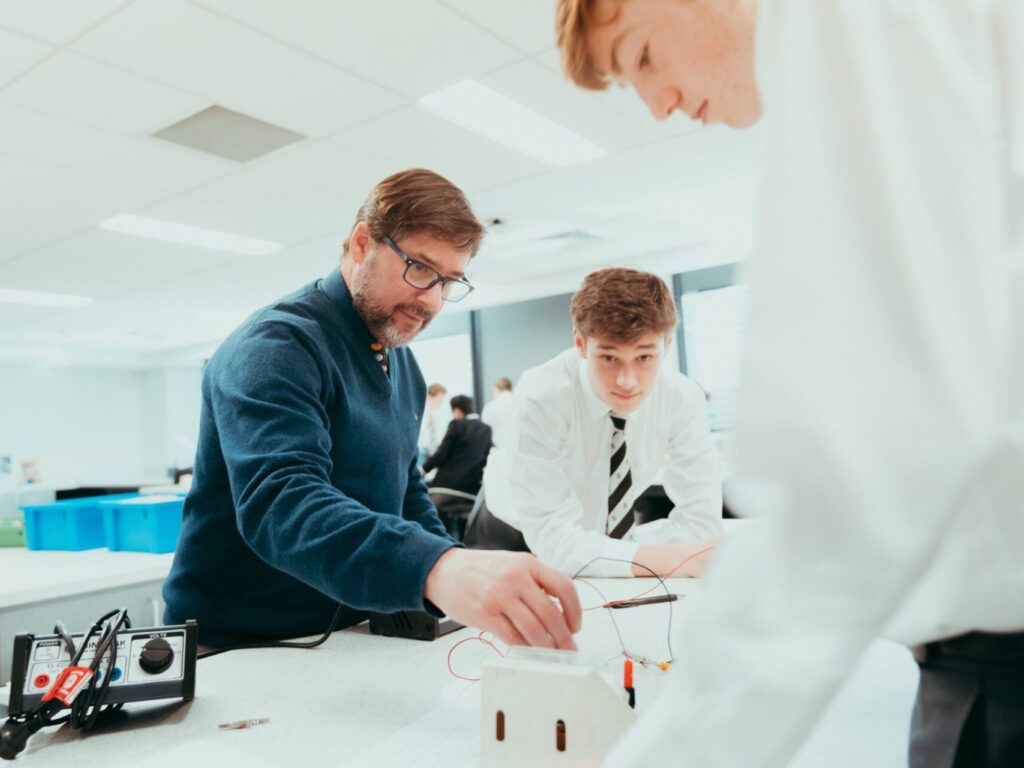Q&A with English, Philosophy and Religious Studies Teacher David Conway
To Newington students, David Conway is an erudite teacher of English, Philosophy and Religious Studies. Scratch the surface and there’s much, much more.
Tell us about your background as an archaeologist. How did that happen and where did it take you?
I was always interested in history at school but was also keen to be outside and active. Archaeology seemed a natural fit for both interests. I did an undergraduate degree at St. Peter’s College, Oxford University in Archaeology and Anthropology.
And did you discover anything that would make us go ‘wow!’?
As part of my studies I became particularly interested in the history of eastern Africa. I had worked on excavations in the UK, mainly Romano-British and Anglo-Saxon sites, the most memorable at Bamburgh Castle in Northumberland where I was able to work on an Anglo-Saxon cemetery site. After finishing my masters, I took up a role with the British Institute in Eastern Africa based in Nairobi, Kenya. From here I was able to work on several projects in Kenya and, most memorably, in South Sudan.
We didn’t really know what we were going to find on the project in South Sudan, but we ended up surpassing our expectations and finding evidence of slave trading forts near the Nile, a very confronting experience.
How did you come to be a teacher?
After returning from Africa, I was hoping to continue to do a PhD, however this was at the height of the global financial crisis and funding for research was being pulled. Although I had the place back at Oxford to do the PhD, I didn’t get funding. So, I cast around in several different jobs for a while before ending up working as learning support at a government school in central London and loved it.
From there, I went on to qualify with Tech First who train graduates as teachers in challenging schools in the UK. I have qualifications in literature, as well as archaeology, so I was trained as an English teacher.
What’s the best thing about literature?
There are a number of things, I think. The variety that literature can bring, in terms of the worlds it can allow you to inhabit, has always interested me. I love being lost in new places, people and ideas. Literature has always been an escape and a solace for me, a place to go to when I need to get away from things and although I do enjoy the classics, I think it’s important to find texts that bring you joy when you read.
Literature opens you up to new ways of think about the world that aren’t available in any other format, it makes you think and challenges you, which I believe is such an important thing.
Your favourite book?
Too many to name! I have various books and series that I enjoy, but I don’t think I have a single favourite, I do tend to favour historical fiction, though. I enjoy Pat Barker’s Regeneration trilogy about writers and soldiers from World War I, or Shogun by James Clavell, or The Last Days of Night by Graham Moore. I also have a soft spot for fantasy writers, such as Jasper Fforde, Terry Pratchett, Ben Aaronovitch, and Genevieve Cogman. One of my favourite writers to read, with the caveats about whether he is fiction or non-fiction, is the Polish journalist Ryszard Kapuściński.
You also teach Theory of Knowledge (TOK) to IB students. What’s the connection between archaeology and TOK?
TOK is about knowledge and thinking about how we know what we know and challenging our assumptions about the world. Archaeology approaches the study of the past in a similar way, trying to challenge our assumptions about the past and about how we once lived and provide new knowledge to broaden our understanding that can work in conjunction with other forms of knowledge about the past.
What was the best thing about studying at Oxford?
There were so many great things about my four years in Oxford. The intensity of study took some getting used to, but it certainly instilled in me a strong work ethic. The academic challenge when being taught by some of the world leaders in their field was really challenging, but I remember all my tutors being wonderful people too.
It was very much a work hard, play hard environment where you threw yourself at as many different things as you could – I was particularly involved in sport at College. It’s a beautiful city to live and work in, too, and I still remember cycling everywhere with real fondness. Finally, the people were fantastic; I made friends for life and also met my wife there.
What would you tell Newington boys who want to study overseas – and especially at one of the world’s great universities?
I would tell them to go for it – it really is a nothing ventured, nothing gained scenario. I applied to Oxford never expecting to get anywhere. Living and working abroad is a real eye-opening experience, but one that is tremendously fulfilling and, as we’ve learned in the last year, it is easier than ever to still stay connected to home at the same time.
What do you love about teaching at Newington?
The people – both the staff and students. Moving from the UK meant that we knew very few people here in Sydney and ever since we arrived my wife and I have been made to feel welcome by the whole Newington community, helping us to settle into our new life here. The boys have always been great, and colleagues have become friends, which has had a huge impact on us.
Tell us something about yourself that your colleagues and students probably don’t know.
People from my hometown in the north of England are often called ‘monkey hangers’ because of an old local legend that stretches back to the 19th century and the Napoleonic wars (it has it that a shipwrecked monkey was hanged by the people of Hartlepool, who believed it was a French spy). I don’t think there’s much truth in the story, but it’s a name that has stuck to people from Hartlepool for a long time now.
When you’re not reading, writing, or riddling out great questions of knowledge and philosophy, what do you do in your spare time?
My wife and I welcomed our first child in October last year so most of my spare time is spent with our daughter and enjoying watching her grow. Outside of family, I am quite heavily involved in rugby union, refereeing Shute Shield first grade and helping to develop student referees here at Newington.
If an archaeologist of the future dug up David Conway’s grave, what would he find?
My kindle, maybe a cricket ball, probably a whistle, and pictures of my family.
And finally, a tough question. You were born and bred in the UK … who do you support in the cricket?
I still shout for England! It does give the boys in my cricket team at Newington something to wind me up about.



